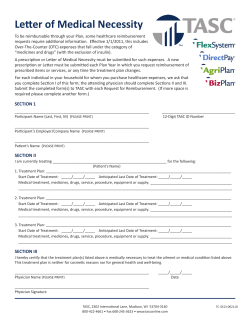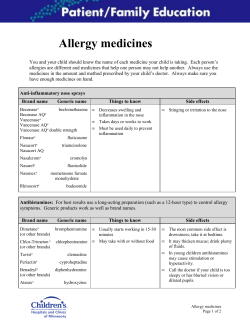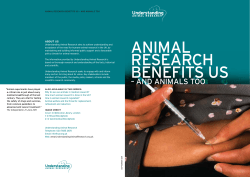
Quick 2015 04 - Issue 34.4 Supplement
Issue 02-15 April 2015 March 2015 Recent Bull eti ns SHEQ01-15 Winter Driving Refer ence Documen ts: Drugs and driving: the law https://www.gov.uk/dru g-driving-law THINK! provides road safety information for road users http://think.direct.gov.u k/drug-driving.html The Issue... The Action On 2 March 2015 the drug driving law changed to make it easier for the police to catch and convict drug drivers. What you should do if you need to take any of the specified medicines It is now an offence to drive with certain drugs above a specified level in your blood, whether your driving is impaired or not. This will make it easier for police to tackle drug takers Do not drive after taking your medicines until you know how they affect you The new law sets limits at very low levels for eight drugs commonly associated with illegal drug use, such as cannabis and cocaine, to tackle drug use and driving. The law also includes eight drugs commonly associated with medicinal use, that are sometimes abused, that have been set at higher limits based on the available evidence of the road safety risk and to reflect their use as medicines. These are: Morphine used to treat pain – opiate / opioid based medication will metabolise (chemically change) into morphine and show in a blood result. Keep taking your medicines as prescribed Do not drive if you feel drowsy, dizzy, unable to concentrate or make decisions, or if you have blurred or double vision. If you are taking your medicine in accordance with the advice of a healthcare professional and / or as printed in the medicines accompanying leaflet and your driving is not impaired, then you are not breaking the law. IF YOU ARE UNSURE HOW THE CHANGE WILL AFFECT YOU, TALK TO YOUR DOCTOR OR A MEMBER OF THE PHARMACY TEAM. Diazepam, oxazepam, temazepam used to treat anxiety or inability to sleep Methadone used to treat drug addiction Amphetamine used to treat attention deficit hyperactivity disorder (ADHD) and Parkinson's disease is also planned to be included within the offence in the longer term. The Consequences Further Info… The penalties for drug driving are the same as for drink driving. If you are convicted you will receive: For further information please contact: A minimum 12-month driving ban A criminal record A hefty fine or up to 6 months in prison or both The consequences of a drug drive conviction are far reaching and can include: Job loss Chris Sutton Director of Safety Health and Wellbeing SHEQual Loss of independence Chris.sutton@mwhglobal.com The shame of having a criminal record All bulletins can be found on KNet: Home> Employee Support> SHEQual> Communications> Bulletins Increase in car insurance costs Trouble getting in to countries like the USA
© Copyright 2025





















